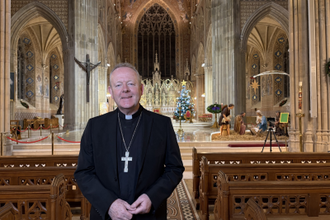A closer look at Vance's views on Catholicism and society

Screenshot
Matthew Howard, Leader for Digital Mission, Redemptorists Oceania, writes:
Donald Trump has been formally nominated as the Republican presidential candidate for the 2024 election and has selected Ohio Senator James David (JD) Vance as his running mate. This announcement marks the beginning of the four-day Republican National Convention in Milwaukee, Wisconsin, where the party will officially nominate its presidential ticket. In a statement posted on his social media platform Truth Social, Mr Trump revealed that he carefully considered numerous talented individuals before making his decision.
JD Vance, author of 'Hillbilly Elegy' and US Senator from Ohio, has publicly discussed his conversion to Catholicism. Raised in a Protestant environment, Vance's journey to Catholicism is part of his personal and spiritual narrative, reflecting his exploration and commitment to faith.
Vance is associated with an ideology known as 'Catholic integralism,' an intellectual movement that, according to experts, advocates for a 'soft power' approach to exerting Christian influence in society. Thinkers within this movement emphasise the significance of having a Christian 'strategic adviser' for leaders in positions of authority.
Despite his alignment with Catholicism, Vance has been known to diverge from certain aspects of Catholic social teaching, particularly in areas such as economic justice, environmental stewardship, immigration, and social justice issues. His views often reflect a more conservative political ideology, emphasising economic growth, national security, and traditional values.
Economic Justice and Poverty
Catholic social teaching emphasises the dignity of every human person and the moral imperative to prioritise the needs of the poor and vulnerable. This includes support for social safety nets, fair wages, and equitable distribution of resources.
Vance's View: While Vance acknowledges the importance of addressing poverty, he often attributes economic disparities more to cultural factors rather than structural injustices. He tends to advocate for policies that promote economic growth and individual responsibility over expansive social welfare programs. This approach can sometimes conflict with Catholic teachings on economic justice and solidarity, which stress the importance of systemic support for the poor and vulnerable.
Environmental Stewardship
Catholic social teaching, particularly under Pope Francis's leadership, stresses the moral responsibility to care for creation and address environmental degradation. This is encapsulated in the encyclical "Laudato Si'," which calls for urgent action to protect the environment and mitigate climate change.
Vance's View: Vance has expressed scepticism about the urgency of climate change and has been critical of environmental regulations that he believes could stifle economic growth, particularly in industries like coal and manufacturing. His stance on environmental issues may diverge from the Catholic emphasis on environmental stewardship and sustainability.
Immigration and Refugee Rights
Catholic social teaching emphasises the dignity of migrants and refugees, advocating for compassionate and just treatment, regardless of legal status. The Church calls for policies that prioritise family unity, humanitarian aid, and integration of immigrants into society.
Vance's View: Vance has taken a more restrictive stance on immigration, advocating for stricter border controls and emphasising the need to prioritise national security and economic concerns. This approach may differ from Catholic social teaching's emphasis on welcoming the stranger and providing refuge to those in need.
Social Justice Issues
Catholic social teaching addresses a range of social justice issues, including racism, healthcare, and human rights. The Church advocates for policies that promote human dignity, equality, and the common good.
Vance's View: While Vance may align with Catholic teachings on certain social issues, such as opposition to abortion and support for traditional family values, his overall political and social views may not always fully align with the comprehensive and integrated approach of Catholic social teaching. His emphasis on individual responsibility and limited government intervention in social issues can sometimes diverge from the Church's call for structural reforms to address systemic injustices.
While as a Catholic he shares some common ground with Church teachings on moral issues, there are notable differences in policy prescriptions and priorities, particularly in areas related to economic justice, environmental stewardship, immigration, and social justice.
LINKS
Who is Vance? www.youtube.com/watch?v=ZLjk-I1b5wA&t=194s
Hillbilly Elegy by JD Vance, review by Rebecca Tinsley - ICN Dec 30th, 2016: www.indcatholicnews.com/news/31637


















